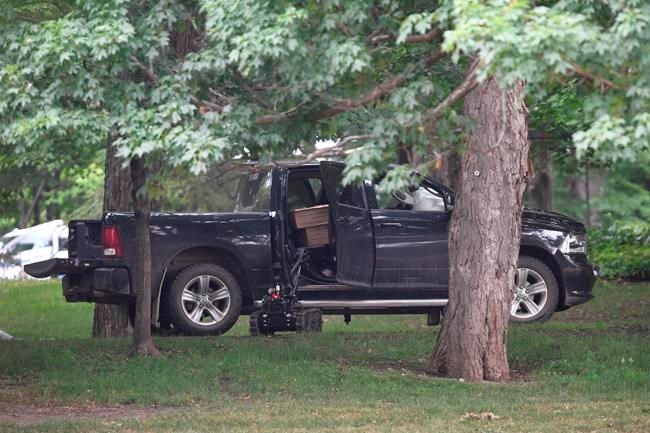OTTAWA — Crown prosecutors are asking that a Manitoba man who rammed a gate at Rideau Hall before arming himself and heading on foot toward Prime Minister Justin Trudeau’s home last summer be sentenced to six years in prison, minus time served.
The request came during sentencing arguments on Tuesday in the case of Corey Hurren, the 46-year-old sausage-maker and Canadian Ranger who pleaded guilty this month to eight charges in relation to the incident at Rideau Hall last July.
Crown prosecutor Meaghan Cunningham told an Ottawa courtroom that Hurren’s actions "were far from benign," and posed a serious threat to public safety while setting up a potentially dangerous situation.
“The RCMP officers involved were able to de-escalate the situation and eventually arrest Mr. Hurren without any shots being fired,” Cunningham told the court.
“But that doesn't change the fact that Mr. Hurren’s deliberate actions on July 2 were incredibly dangerous. They created a risk of harm or death to anyone that might have been caught up in what he had planned.”
Cunningham also asked that the court order a DNA sample be taken and that Hurren be banned from owning any weapons for life.
During his own submission, defence lawyer Michael Davies said he was seeking a sentence of three years less time served.
He argued that while his client made a series of bad decisions, “ultimately, he made one correct decision: the decision to put those guns down.”
“I'm not here to say you should be congratulated on that decision,” Davies said. “But if he's to be held accountable for his decisions, and he should be, your honour also has to take into consideration that ultimately, at the end of the day, he put the guns down.”
Justice Robert Wadden is expected to deliver his sentence on March 10.
In asking for a lesser sentence, Davies described his client as a hardworking member of society who enjoyed his work as a Ranger and was involved in his community’s Lions Club before financial challenges started to crop up in late 2019.
Those challenges were exacerbated by the onset of the COVID-19 pandemic, Davies said, and led Hurren into a state of depression.
“COVID has dealt many of us blows, some more than others,” Davies said. “In his particular case, it took away his remaining livelihood. … And so now Mr. Hurren is getting into this downward spiral of no money coming in but money still has to go out.”
Davies added that Hurren is already facing fallout from his actions besides the prospect of several years in jail, including the start of divorce proceedings by his wife and the military’s move to permanently discharge him from the Rangers.
Cunningham, however, said that Hurren had not expressed any remorse for his actions or an "appreciation of the gravity of his conduct.” She added that his actions were not impulsive, but that Hurren had planned and thought about them for at least several days.
“Corey Hurren was prepared to die for his cause. He believed his message was that important,” Cunningham told the court.
“The motive behind his actions was not suicide. He wasn't doing this in order to die. He simply recognized that being killed might be an unavoidable consequence of his actions. … Mr. Hurren’s motive is clear: It was to send a political message.”
Hurren drove a truck onto the grounds of the Governor General’s official residence on July 2 last year and rammed through the gate, which caused the vehicle to stall and its airbags to deploy.
He then set out on foot toward Rideau Cottage, where Trudeau and his family are living due to unresolved questions about costly repairs needed at the prime minister’s traditional official residence at 24 Sussex Drive. Trudeau was not home at the time.
Police were able to talk Hurren down and arrested him peacefully after about 90 minutes.
He was initially accused of uttering a threat to “cause death or bodily harm” to Trudeau.
But in an agreed statement of facts read in an Ottawa courtroom on Feb. 5, Hurren told police he didn’t intend to hurt anyone, and that he wanted to arrest Trudeau to make a statement about the government’s COVID-19 restrictions and its ban on assault-style firearms.
He said he had hoped to make the arrest during Trudeau’s daily pandemic briefing outside Rideau Cottage.
Hurren, who told police he hadn’t qualified for emergency aid benefits, was angry about losing his business and his guns. He believed Canada was turning into a communist state.
Hurren also told police at the scene that he wanted to show Trudeau “how angry everyone was about the gun ban and the COVID-19 restrictions” and said the prime minister “is a communist who is above the law and corrupt.”
During a police interview after his arrest, Hurren said “he’s not a bad guy for doing this and he did not want to hurt anyone.” Asked what his plan was, he replied: “I don’t think there was one.”
Asked if he had any regrets, Hurren, who’d spent two days driving from Manitoba to Ottawa, said he wished he'd stopped to see the Terry Fox statue near Parliament Hill.
Data retrieved from his cellphone, Facebook and Instagram posts included exchanges with friends about “conspiracy theories related to the Canadian government,” as well as a “sacrifice theory” related to the date of the mass shooting in Nova Scotia last April and suggestions that COVID-19 is a hoax.
Police seized five firearms from Hurren at Rideau Hall, including a restricted revolver, a prohibited pistol, a prohibited rifle, two shotguns and a prohibited high-capacity magazine. Eleven more long guns were seized from his Manitoba residence.¬Ý
This report by The Canadian Press was first published Feb. 23, 2021.
Lee Berthiaume, The Canadian Press




